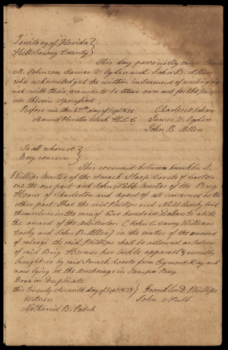
Hillsborough’s Oldest Book Now Online
Hillsborough County’s oldest book, once locked away from public view in a Clerk’s Office vault at the County Courthouse, is now accessible to the world thanks to the efforts of the Tampa Bay History Center and the USF Library.
The Daybook, which dates back to the 1820s before Florida was even a state, was used to record the ownership and transfer of property—including slaves. Its pages, yellowed and stained from age, are filled with elaborate, hand-written cursive.
Now all 448 pages have been digitized and placed online for all to view. https://digitalcommons.usf.edu/regional_ebooks/17/
The book was taken apart and the fragile pages were carefully scanned by the USF Library staff, which took a couple of hours. The images were edited with Photoshop, which took another 10-12 hours. The pages were cataloged and placed on the library’s website. The book was rebound and is stored at the History Center’s library.
Hillsborough Clerk of Court & Comptroller Pat Frank last summer personally delivered the Daybook to Rodney Kite-Powell, director of the Touchton Map Library and Saunders Curator of History at the Tampa Bay History Center last summer. “The information preserved within the pages of the Daybook provides incredible insight into an era that is rarely considered today,” he wrote in the Tampa Bay Times. “Most of the subject matter within the book deals with property transfers, including human property — slaves. Though all of the entries are important and potentially provide previously unknown details, the entries involving slavery have garnered the most attention. Those entries also hold great promise for researchers and genealogists.
On page 46, for example, an entry dated June 15, 1827, records a dispute over the ownership of a slave. “Whereas, a dispute has been raised concerning certain Negro Woman named Rosa,” it states. “We the undersigned Chiefs of the Apalachicola Indians all know that the said Rosa was the property of the Black Factor and that in his life time he gave the said Rosa to his son Samuel Factor and that she has remained the property of said Samuel ever since and no person has put up any claim to her and if any other person has any claim to her it is unjust.” Two pages later, on May 27, 1832, Sam Factor records that he has freed his wife “to enjoy all the freedom and privileges of the tribe of Indians to which they are now living with and also my daughter Sarah and my two sons Billy and Daniel…”
The digitized pages are much easier to read online than the originals because the pages can be magnified to improve comprehension of the 19th Century pen and ink writing.
“I am thrilled that our partnership with the Tampa Bay History Center and USF has made this historical document available to the world to see,” said Hillsborough Court Clerk & Comptroller Pat Frank.